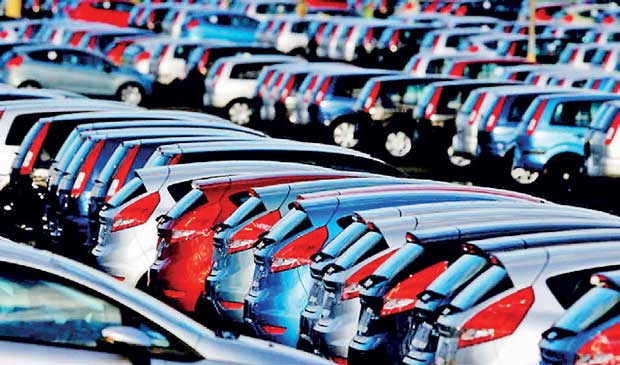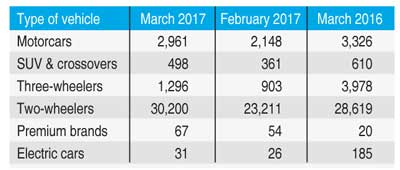02 May 2017 - {{hitsCtrl.values.hits}}

Vehicle registrations demonstrated a strong rebound in March compared to the previous two months, despite the monetary impediments slapped to discourage private motor vehicle purchases.
According to a monthly analysis of vehicle registrations by JB Securities Private Limited, a Colombo-based equity brokerage and research house, the number of vehicle registrations in March had spiked to 39,173 units from 29,945 units in February but little down from 40,438 units in the same month, last year.
The spike in vehicle registrations is a clear indication that Sri Lankans somehow find the means to buy a vehicle of their own partly out of social pressure and mostly due to the miserable public transportation system, specially in the capital, Colombo.
Sri Lanka lacks a master plan to develop the public transport, despite the election-time outbursts of highways, monorails, metros and so and driving in Colombo during peak hours is literally a nightmare due to congested roads and unruly drivers.
Sri Lanka does not have a system to incentivize the drivers who abide by the road rules. Generally on Sri Lankan roads, the drivers who go by the road rules tend to end up in the losing side because breaking road rules has become so commonplace and general order of the day. Our Page 3 today on LB Finance PLC also demonstrates still stronger vehicle leasing during the January-March quarter despite higher down payment and interest rates.
This is why there is a spike in motorcycle registrations in March to 30,200 units from 23,211 units in February.
This demonstrates even those who earlier wanted to buy a small car or a three-wheeler have now resorted to a motorcycle to avoid the agony in the public transport. (See the table below for registration numbers for each category).
 It should be noted that a massive number of vehicles on an inadequate road network with unruly drivers and an uninterested traffic police force could be a lethal combination.
It should be noted that a massive number of vehicles on an inadequate road network with unruly drivers and an uninterested traffic police force could be a lethal combination.
The much hyped US $ 40 billion Western Province Megapolis Development Project, which gives much emphasis to a sophisticated, multi-model transportation system, is yet to become a reality as the entire project is awaiting investments.
However, foreign direct investment to the country in 2016 was a paltry US $ 450 million.
When a country graduates to a middle-income country, there is a higher tendency for the population to own a personal vehicle, mostly a car or a sports utility vehicle (SUV), because their incomes and aspirations grow higher.
But governments with foresights tend to discourage citizens owning personal vehicles considering the possible socio-economic problems decades ahead and instead improve the public transport systems to world-class levels so that even the rich don’t necessarily need to own a car.
Singapore is a case in point with one of the highest per capita incomes in excess of US $ 70,000. Singapore’s tax policy discourages vehicle purchases by its citizens but has the most sophisticated multi-model public transport system.
Sri Lankan policymakers neither had the foresight nor the will to employ such policies. The promise of motor vehicles for every citizen during an election still remains an attractive method to come to power.
The governments in power every time tend to slash import duties on motor vehicles during their re-election bids.
05 Oct 2024 2 hours ago
05 Oct 2024 3 hours ago
05 Oct 2024 5 hours ago
05 Oct 2024 6 hours ago
05 Oct 2024 6 hours ago